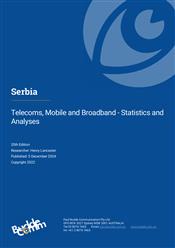Serbia Telecoms Market Report
Telecoms, Mobile and Broadband - Statistics and Analyses

Serbia sees progress towards 5G auctions
Serbia’s telecom industry has been liberalised in line with the principles of the EU’s regulatory framework for communications, focussed on encouraging competition in telecom products and services, and ensuring universal access.
Considerable network investment has been undertaken in Serbia by incumbent and alternative operators in recent years, despite economic difficulties. This has helped to stimulate internet usage, which has also been bolstered by improved affordability as prices are reduced through competition. The pandemic has stimulated consumer take up of services, particularly mobile data. The government’s various initiatives to improve rural broadband availability have also been supported by European development loans.
Serbia’s high mobile penetration, partly the result of multiple SIM card use, has weighed on revenue growth in recent years, placing further pressure on operators to develop business models which encourage consumer use of mobile data services also in response to the continued substitution of fixed-line for mobile voice calls.
The regulator has yet to auction 5G-suitable frequencies, though operators are already investing in their networks in preparation for this next growth frontier. During 2021 the regulator resumed the process towards a 5G spectrum auction, which had been delayed owing to the onset of the covid-19 pandemic.
In early 2021 Telekom Srbija agreed to provide Telenor Serbia with access to its fibre network. Despite accusations from United Group, which owns the principal cable broadband player SBB, that the deal could undermine SBB’s market position, the Group has also agreed to share network assets. Telenor (now operating as Yettel, and owned by the PPF Group), joined the fixed market in November 2021, launching fibre-based fixed broadband, fixed voice, and digital TV services. The operator is looking to bolster its returns by focussing more strongly on the uptake of converged services in the market. These developments could lead to a significant shift in the telecom market landscape.
The outbreak of the pandemic in 2020 had an immediate impact on telecoms services uptake. However, the sector has returned to growth buoyed by an improving economic outlook for the country and rising consumer and enterprise demand for advanced communications services. The crucial nature of telecom services, both for general communication as well as a tool for home-working, has helped to offset pressures on market development.
The report also covers the responses of the telecom operators as well as government agencies and regulators as they react to the crisis to ensure that citizens can continue to make optimum use of telecom services. This can be reflected in subsidy schemes and the promotion of tele-health and tele-education, among other solutions.
Key developments:
- MTS trials 5G services with Ericsson, Yettel selects Huawei;
- Telekom Srbija agrees to buy Posta NET;
- PPF Group rebrands Telenor Serbia to Yettel;
- Regulator invites expressions of interest for delayed spectrum auction;
- SBB commits €240 million to fixed broadband network investment over three years;
- European Investment Bank to lend Telekom Srbija €70 million to finance 5G, LTE and fibre network expansions;
- A1 selects Nokia for countrywide 5G network expansion;
- Report update includes the regulator’s annual reports, market data report to March 2022, telcos’ operating and financial data to Q1 2022, updated telecom Maturity Index charts and analyses, recent market developments.
Companies mentioned in this report:
Mobilna Telefonija Srbija (MTS), Telekom Srbija, Vip Mobile, Telenor Serbia, Serbia Broadband (SBB), I.KOM, Knight Development Support, Invest-Inženjering, Beogrid, JET TV, Kopernikus Technology, BeotelNet, Posta NET, Sat Trakt, Telemark and Radijus vektor.
Related Reports
- Europe - Mobile Network Operators and MVNOs
- North Macedonia - Telecoms, Mobile and Broadband - Statistics and Analyses
- Slovenia - Telecoms, Mobile and Broadband - Statistics and Analyses
- Slovakia - Telecoms, Mobile and Broadband - Statistics and Analyses
- Belgium - Telecoms, Mobile and Broadband - Statistics and Analyses
- Finland - Telecoms, Mobile and Broadband - Statistics and Analyses
- Albania - Telecoms, Mobile and Broadband - Statistics and Analyses
- Lithuania - Telecoms, Mobile and Broadband - Statistics and Analyses
- Bulgaria - Telecoms, Mobile and Broadband - Statistics and Analyses
Share this Report
TMT Intelligence
A platform to scale your intelligence tasks
Monitor critical insights with our AI-powered Market Intelligence Platform gathering and analyzing intelligence in real time. With AI trained to spot emerging trends and detect new strategic opportunities, our clients use TMT Intelligence to accelerate their growth.
If you want to know more about it, please see:
Research Methodology
BuddeComm's strategic business reports contain a combination of both primary and secondary research statistics, analyses written by our senior analysts supported by a network of experts, industry contacts and researchers from around the world as well as our own scenario forecasts.
For more details, please see:
More than 4,000 customers from 140 countries utilise BuddeComm Research
Are you interested in BuddeComm's Custom Research Service?
Hot Topics
News & Views
Have the latest telecommunications industry news delivered to your inbox by subscribing to BuddeComm's weekly newsletter.